Reviews and reports. Рубрика в журнале - Arctic and North
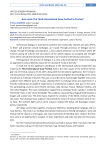
Arts unite: The Third International Snow Festival in Tromsø
Статья научная
The article is a brief overview of the Third International Snow Festival in Tromsø, January 23–26, 2019, from the perspective of international cooperation in northern Europe in the context of the world culture integration and cross-cultural dialogue.
Бесплатно
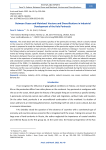
Статья научная
The article deals with the economic specifics of the peninsula’s territory, which is closely related to the resources of both the mainland and the ocean. Using the example of the Murmansk Oblast, an approach is proposed to study the industrial development of the peninsular region in the Soviet period, taking into account the competition of two versions. One of them was aimed at creating an “oceanic” economy – the fishing industry and marine transport. Another version served the “mainland” economy, represented mainly by mining industry. Specific historical materials are used to examine the pendulum effect, i.e. the fluctuations between these two versions and the formation of prerequisites for diversification. Of particular interest is the experience of combining two versions, which appeared in 1923, when an industrial transport and colonization combine was created on the basis of the Murmansk railway, and later, during the industrialization of the 1930s. It is debatable whether the two old versions were successfully transformed into the third “ocean-mainland” one, based on the idea of the integrated development of the resources of the Kola Peninsula and the seas surrounding it, which was most noticeably manifested during the Soviet economic reform of 1957. The prospects for studying this issue may be related to the use of methods of historical and economic analysis.
Бесплатно
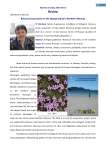
Botanical Excursions on the Sørøya Island in Northern Norway
Статья научная
Bilingual guidebook “Botanical excursions on the northern Sørøya (Finnmark, Norway)” is presented in the article.
Бесплатно
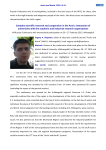
Статья научная
Review of the conference which took place at the Northern (Arctic) federal University (Arkhangelsk) in February 26—27 2015 and was dedicated to various questions of development of the Arctic. Some presentation are highlighted in the review, speaker’s suggestions included in final resolution are represented.
Бесплатно
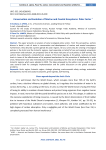
Conservation and Evolution of Marine and Coastal Ecosystems: Polar Factor
Статья научная
The paper presents an analysis of polar ecological policy actors. From this perspective, authors discuss in detail a role of state in conservation and development of marine and coastal ecosystems. Furthermore, they describe a green agenda for polar regions. At last, some ways for creating of ecological policies in the Arctic and the Antarctic regions, most especially on behalf of sea and marginal ecosystems conservation and evolution, are proposed. One of the most vital parts of such policies is staff training. The authors have attempted a comprehensive analysis of the Green Agenda at the global, national and local levels in terms of the effectiveness of its proposed mechanisms for the protection of biodiversity in polar areas. Researchers have also reviewed plans of Russia according to the new set of strategies for Arctic and Antarctic regions, which were adopted in 2020. The ideas proposed by the authors can be used in a real-case scenario both for strategies implementation and for public discussion on the global ecological problems.
Бесплатно
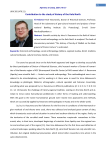
Contribution to the study of history of the Kola North
Статья научная
Scientific activity by Irina A. Razumova in the field of historical and social anthropology on the Kola North is analyzed. The book of documentary materials "The History of Family of Zhidkih on the Background of Pomor Culture" is estimated.
Бесплатно
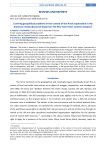
Статья научная
The article is based on a review of the geopolitical problems of the Arctic region, represented in the contemporary American media discourse on the example of the newspaper «The New York Times». The paper was chosen because it is an example of traditional American journalism, which adheres to the princi-ples of objectivity. As a result of the analysis, the following trend was found — throughout 2001-2005 years the newspaper actively presented two Arctic issues: the feasibility of oil drilling in Alaska and the problem of climate change in the Arctic. Since 2007, the arctic problematics on the pages of newspapers became relevant in the context of geopolitical issues, which was connected to the event of August 2, 2007, namely the setting of the Russian flag in the Arctic Ocean. Coverage of the Arctic issues was carried out in the context of competition, and later — international cooperation. In the period from 2011 to 2018, the focus of the American newspaper was pointed out to the climate change and resource development in the Arctic.
Бесплатно
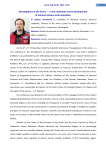
Development of the Arctic — a new milestone in the development of national science and innovation
Статья научная
Review of materials of the conference held on December 3—6, 2014 in Salekhard.
Бесплатно
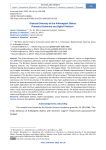
Dialectal Diversity of the Arkhangelsk Oblast: Thematic Dictionary and Digital Platform
Статья научная
The article discusses the “Thematic dictionary of Arkhangelsk dialects”, which is a single-dialect, non-differential explanatory dictionary, and the digital platform that supports the printed materials of this dictionary. The Northern Russian dialects maintain archaic linguistic features, making them attractive for linguistic research. The “Thematic dictionary of Arkhangelsk dialects” contains unique linguistic material collected during dialectological expeditions in the Arkhangelsk Oblast. The distribution of material according to topics contributes, on the one hand, to more in-depth and detailed representation of lexemes and expressions, and, on the other hand, to systematic organization of individual aspects of the worldview of the speakers of the Northern Russian dialects. Within the grant project “Thematic dictionary of Arkhangelsk dialects with electronic support”, conducted by the Northern (Arctic) Federal University named after M.V. Lomonosov, the first three volumes of the dictionary have been published and an independent corpus of dialects has been developed and hosted on the university’s servers. The digital platform consists of desktop and mobile applications for the collection of dialect words, as well as a database and electronic dictionary accessible via a web interface, supplemented by an interactive lexical atlas. The developed lexical atlas provides a visual representation of geographical distribution of dialect words. The dialect material presented in the dictionary and on the platform will be useful both for specialists and for individuals interested in the culture and lifestyle of the Russian North.
Бесплатно
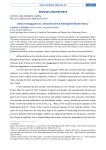
District newspapers as a chronicler of the Arkhangelsk North history
Статья научная
The article discusses the creation and operation of district periodicals in the Arkhangelsk Oblast. The author analyzed their role in solving problems in different periods and evaluated the place of the “district” in the relations of the state and local authorities. Based on a study of modern local periodicals, the author concluded that the press, freed from the CPSU dictates, became dependent on new power and was forced to cover mainly its activities and achievements. The way out of this situation is the creation of municipal newspapers.
Бесплатно
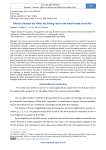
Efforts to Restore the White Sea Fishing Fleet in the Initial Period of the NEP
Статья научная
The recovery period of the early 1920s in Soviet Russia coincided with the search for new forms of production management and was complicated not only by economic devastation, but also by the difficult international situation, political and economic blockade of the country. Under such conditions, the long overdue task of modernization of fishing and fur-trading was solved in the Arkhangelsk province, which first of all required providing the fishermen with the newest vessels. Lack of coal did not allow using steam vessels in full measure in the fishery; purchase and construction of vessels at foreign shipyards were also difficult. Therefore, it was decided to restore peasant shipyards as a temporary measure, centrally organizing the construction of small fishing vessels under the supervision of qualified technicians. The models used were Norwegian-built sailing, rowing and motor vessels, which were considered to be the most suitable for fishing in the White Sea and Arctic Ocean. The difficulties that the economic institutions had to face during the transition period (from war communism to the new economic policy) are considered in this article with the help of a large set of archival and published sources. The transition to the use of trawlers and icebreakers is explained not only by the tasks of modernization of the fishing economy, but also by the revolutionary ideology: to prevent conditions for the emergence of a prosperous layer of the Pomor population, which included shipbuilders and shipowners.
Бесплатно
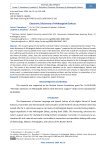
Electronic Dictionary of Arkhangelsk Dialects
Статья научная
The research group of the Northern (Arctic) Federal University is implementing the project “Thematic dictionary of Arkhangelsk dialects with electronic support” supported by the Russian Science Foundation. The project aims to publish three issues of the dictionary, which will include the vocabulary reflecting the traditional world picture of the Arkhangelsk peasant: the first issue contains the vocabulary related to the names of clothes, shoes, hats; the second issue contains the names of residential and non-residential buildings; the third issue contains the vocabulary naming the food and drinks of the Arkhangelsk inhabitant. The second task of the project is to create an electronic dialect corpus devoted to the Arkhangelsk dialects, which is currently not available in universities of the North-West region. The article presents the experience of the project, which is at the intersection of dialectology, ethnography, cultural studies and corpus linguistics. The results of this research and the electronic database can be used in dialectological, folklore and ethnographic expeditions, in teaching Russian literature at universities and schools, in organization of local history work, in educational projects aimed at promoting northern spiritual culture, in preparation of cultural and scientific events devoted to the language and culture of the Russian North.
Бесплатно
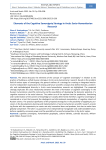
Elements of the Cognitive Sovereignty Strategy in Arctic Socio-Humanitarian Research.
Статья научная
The article discusses the elements of the concept of “cognitive sovereignty” in relation to the practice of building a unified Russian strategy in Arctic socio-humanitarian research. Based on the problem field of various types of sovereignty, the general outlines of a strategy for creating an integrated mechanism for independent examination of existing and future scientific concepts that define thematic, problematic and methodological diversity in Arctic socio-humanitarian research are highlighted. The proposed strategy explicates the close relationship between the level of formation of cognitive sovereignty in the Russian humanitarian scientific community and the possibilities of developing the domestic potential of a cognitive resource in the social sciences. The authors are of the opinion that the production, functioning and transformation of the content of knowledge are socially determined; therefore, cognitive sovereignty is considered as a tool that prevents the ideological and informational manipulation of cognitive intents of Russian science. The practical significance of the proposed strategy lies in the possibility of applying its provisions in the development, planning and implementation of socio-humanitarian scientific research, providing Russia with the opportunity to create not only innovative ideas and products, but also to make them globally competitive. The latter is a guarantee of an independently manageable and understandable future, defense capability, economic power and the possibility of successful competition in the Arctic region.
Бесплатно
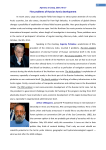
Five problems of Russian Arctic development
Статья научная
In recent years, Large circumpolar fields have begun to attract great attention of not only Arctic countries, but also states, situated far from high latitudes. In conditions of global climate changes a possibility of exploitation of these fields became possible. Here great deposits of hydrocarbon crude and mining materials are open. And the Northern Sea route promise to become the international transport corridor, where length of investigation is increasing. These problems were in the center of participants’ attraction of regular meeting «Mercury club», which took place in October, the 8th, 2014.
Бесплатно
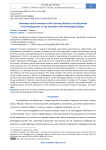
Статья научная
Territorial development is aimed at identifying and actively using resources, opportunities, and socio-economic potential to improve the quality of life of the population, increase attractiveness among investors, tourists, and representatives of economically active social groups. The complexity of territorial development is that it is necessary to take into account a large number of external factors, such as the political and economic situation in the country and the world, socio-demographic processes, the spread of modern information technologies, and much more. It is impossible to ignore the internal characteristics of the territory: its history, natural and climatic features, level of urbanization, resource potential, dynamics of social processes, etc. The diversity of relationships and contradictions between the external and internal environment of the territory complicates the process of territorial development. To overcome these contradictions, it is necessary to form a holistic image or brand of the territory aimed at the most complete and effective use of the resource potential. This article considers the process of formation and promotion of the territory brand as a tool for its development. The problems hindering the effective branding of the territory have been identified. The SWOT-analysis of the Arkhangelsk Oblast is carried out on the basis of the generalization of statistical data characterizing the socio-economic situation of the region. Proposals aimed at overcoming the problems of territorial brand development, related to the implementation of a targeted program of public involvement in the formation of an attractive image of the region, are developed.
Бесплатно
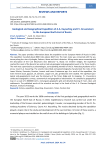
Статья научная
The paper provides information about the expedition to the European North of Russia in 1843. The expedition travelled about 8000 miles (about 8427 km). The main route was connected with the waterway along the rivers Vychegda, Pechora, Izhma and their tributaries. Hiking routes were connected with the description of the Ural Mountains sites (Bolvano—Iz, Skala). On reindeer sledges, the expedition reached the coast of the Barents Sea and carried out geological and geographical work in the Timan tundra. The work was supervised by a paleontologist, corresponding member of the St. Petersburg Academy of Sciences, Count A.A. Keyserling. The scientist described and paleontologically characterized the rocks of the Lower Silurian, Devonian, Permian, Jurassic and Lower Cretaceous age. As a result of the expedition, the main minerals (coal, gypsum, oil, domanic, copper ore, salt, grindstone) were studied. The significant geological and geographical result was the discovery of the Timan Ridge and its mapping. P.I. Krusenstern conducted topographic surveys, astronomical and geographical observations. He compiled a geographical map on a scale of 1:3000000 with a rectangular geographic grid and detailed drawing of rivers, lakes and settlements. The published works of the scientists are kept in the funds of the A. A. Chernov Geological Museum, Institute of Geology.
Бесплатно
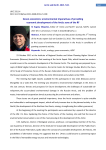
Статья научная
A short review of reports and discussions during the 2nd meeting of the Arctic expert club on October 23, 2015. The meeting was dedicated to the issues of environmental protection in the Arctic in conditions of growing economic activity.
Бесплатно
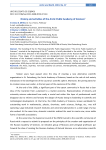
History and activities of the Arctic Public Academy of Sciences
Статья научная
The founding of the St. Petersburg Scientific Public Organization “The Arctic Public Academy of Sciences”, created at the beginning of the 21st century, is briefly described in the article. The Academy is based on the Arctic direction of the Geopolitics and Security Section of the Russian Academy of Natural Sciences. Three stages of its development are designated and commented on, as well as the main directions of the Academy's activities, and examples of projects. The Academy actively participates in international forums, conferences, summits, committees, and festivals. Being an expert scientific organization, APAS plays a vital role in civil society and consolidates domestic intellectual potential.
Бесплатно
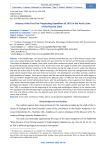
History of the First Ore Prospecting Expedition of 1491 in the Arctic Zone of the Russian State
Статья научная
In the Middle Ages, the Russian state, formed around Moscow, was in dire need of metals. However, only comparatively poor quality swamp iron was mined on the territory of the Russian principalities. There were no deposits of copper, silver, gold, or any other nonferrous metals, and all these metals had to be purchased abroad, paying mainly in furs. At the same time, the supply of metals was constantly threatened by bans from Western countries. In the 15th century, during the reign of Ivan III, under the influence and with the active help of his wife Sophia Palaeologue, the Muscovite state was strengthened and developed, which required more and more financial resources. The development of artillery created a need for large quantities of copper. There was an urgent need for own metal deposits, the search for which began in the vast northern Novgorod lands, annexed to the Moscow state. In 1491, the first state ore prospecting expedition was sent to the Pechora River basin, with the participation of ore explorers from Western Europe, which discovered copper and silver ores on the Tsilma River. The Tsilemskoye deposit was the first developed ore deposit in the history of the Russian state. The first copper smelter was built here. Therefore, 1491 is considered to be the beginning of the mining and metallurgical industry in the Russian state. This expedition marked the beginning of prospecting, exploration and mining in the newly annexed lands of the Urals and Siberia, where new ore deposits were later found, which served to create the mineral resource base of Russia.
Бесплатно


